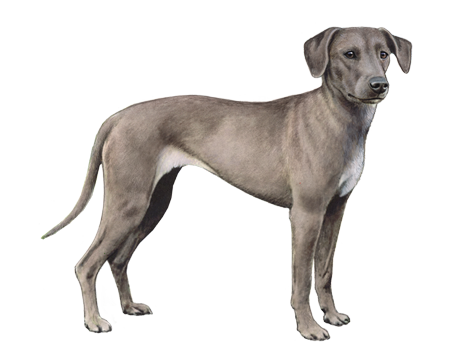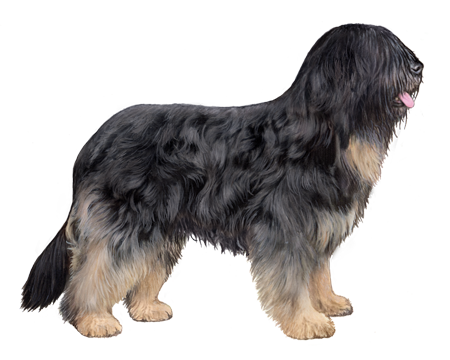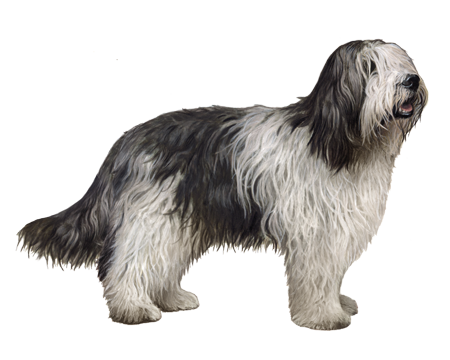
Puli
The Puli is a loyal, smart herding dog that traces its origins to Hungary; there, it's a popular working dog. In the United States, people may recognize the breed by its unique corded coat and affectionate personality.
Interested in discovering if your dog is a Puli?
Check out Wisdom Panel's DNA tests.

Puli Traits
General Appearance
The Puli is a medium-sized dog with almost square proportions. These dogs are vigorous, acrobatic, alert, and active; they move with a distinctive quick-stepping gait.
Coat and Coloring
Pulik have dense, weather-resistant coats that are profuse all over their bodies.
Their undercoat is soft and woolly, while their outer coats are wavy or curly. The hair on their coats clumps together and, when allowed to grow, forms woolly cords of varying shapes and thicknesses that are either flat or round. The cording gets longer with age and may eventually reach the ground. The show standard allows both corded and brushed coats.
Pulik come in four solid colors: black, rusty black, gray (all shades), and white. Black and gray dogs can have gray, black, or white hairs, but they must maintain their overall solid-colored appearance.
Distinctive Physical Traits
Pulik have medium-boned bodies with level, strong backs and moderately broad, deep chests. They have short, strong loins, and muscular hindquarters.
These dogs also have straight muzzles, hanging, V-shaped ears, and large, almond-shaped, dark brown eyes with black or slate gray rims.
Puli Temperament
Though bred to work, Pulik are now known as homebodies that delight in spending time with their families. They are affectionate, faithful companions, but their herding instincts remain intact. Pulik may herd other animals and children—but always with a gentle touch.
Pulik are adaptable enough to thrive in many different living situations. Their natural suspicion of strangers makes them excellent guard dogs.


Puli History
Experts believe that the Magyar, a nomadic tribe from Asia, brought Pulik (the plural of Puli) to the Hungarian plains more than a thousand years ago. Pulik were revered for their skills, herding large flocks of sheep across harsh terrain; their corded coats protected them from the extreme climate.
In the seventeenth century, interbreeding threatened the breed, which teetered on the verge of extinction until 1912 when efforts to increase the number of Pulik helped boost the population. The first breed standard then formed in 1915.
Puli Care
Nutrition
Feed the Puli a high-quality dog food that is appropriate for their life stage (puppy, adult, senior) and consider a diet formulated for active breeds. Portion out their food with a measuring cup and limit treats to no more than 10 percent of their daily calories to avoid overfeeding.
Grooming
Achieving a beautiful coat requires care. Puppies need regular baths, but their hair won't yet form cords.
Around eight to ten months, Pulik start getting their undercoats. Their hair will begin to feel thick and matted, and those clumps of hair must be separated into quarter-sized sections to start creating cords. Mature cords shouldn't get brushed, but occasional baths will help keep your Puli's coat clean. Their cords will need occasional separation.
Pulik also require regular ear cleanings, nail trims, and a dental care routine that includes at-home teeth brushing and professional cleanings.
Exercise
Pulik are energetic dogs that require lots of exercise. In addition to brisk walks, Pulik do well in dog sports such as agility, obedience, and herding. Mental stimulation is important, too. Play games like hide and seek or offer puzzle toys to keep these active, intelligent dogs are engaged.
Training
Pulik are intelligent, keen to learn new things, and eager to please, making them excellent students.
These dogs are also headstrong and require consistent training to help them master commands. Focus on positive reinforcement and rewards-based training. Avoid repetitive activities, which will cause these dogs to lose interest in training.
Early socialization is also essential to help Pulik feel more comfortable with strangers.

Puli Genetic Health Conditions
-
Chondrodystrophy (CDDY) and Intervertebral Disc Disease (IVDD) Risk
Chondrodystrophy (CDDY) is a skeletal disorder characterized by shortened limbs and abnormal early degeneration of the spinal discs, or intervertebral disc disease (IVDD), which predisposes to disc herniation.
Knowing if your Puli is a carrier or at-risk for these conditions can help you and your veterinarian plan for your pup’s lifelong care. With Wisdom Panel™ Premium, you can get results for over 200 genetic health tests.
Breed Group
Herding
The herding group is a diverse category. These highly intelligent breeds were developed to guard and control the movement of livestock.
Resources
https://www.akc.org/dog-breeds/puli/
http://images.akc.org/pdf/breeds/standards/Puli.pdf
Reviewed July 26, 2020 by Laura Inman, DVM























































